|
|
|
Sort Order |
|
|
|
Items / Page
|
|
|
|
|
|
|
| Srl | Item |
| 1 |
ID:
158589
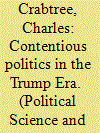

|
|
|
| 2 |
ID:
160570
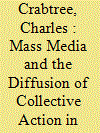

|
|
|
|
|
| Summary/Abstract |
A growing literature attributes the rapid diffusion of domestic collective mobilization against authoritarian regimes to foreign mass media broadcasts. We examine this relationship in the context of the June 17, 1953, uprising in East Germany, the first national rebellion against communist rule in Eastern Europe. The uprising involved an extraordinarily swift and wide-ranging diffusion of antiregime collective action. Observers on both sides of the Iron Curtain attributed the revolt to Western media broadcasts, particularly news broadcasts by the Radio in the American Sector (RIAS) of Berlin. While historians have strongly endorsed this view, social scientists have never quantitatively tested it. We investigate the potential relationship between municipality-level protest events and RIAS broadcasts by exploiting plausibly exogenous variation in RIAS signal strength across East Germany. We find no evidence to support the hypothesis that RIAS caused the diffusion of protest during the uprising. Instead, our results suggest that social ties likely played an important, and underrecognized, role in the swift diffusion of antiregime collective action.
|
|
|
|
|
|
|
|
|
|
|
|
|
|
|
|
| 3 |
ID:
153926
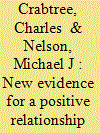

|
|
|
|
|
| Summary/Abstract |
Does increased judicial independence lead to increased state respect for empowerment rights? Initial research on this topic suggested an affirmative answer, but new data calls this into question. We use new measures and modeling approaches to re-examine the effect of de facto judicial independence on state respect for empowerment rights. Empowerment rights include the rights to electoral self-determination, domestic movement, foreign movement, religious freedom, freedom of speech, and assembly and association. These rights are vital to democratic governance. They affect citizens’ fundamental relationships with their government: the ability of citizens to criticize the government, the ability to live according to their belief systems, and their ability to seek refuge from repressive governmental actions. Our analysis reveals a positive, and robust, association between de facto judicial independence and state respect for these rights. We also examine two potential mechanisms that might explain this association. We conclude that the presence of de jure protections of organizational rights conditions the effect of de facto judicial independence on respect for empowerment rights. Our findings suggest that other domestic institutions, such as constitutional provisions that protect organizational rights, may also help improve state respect for empowerment rights.
|
|
|
|
|
|
|
|
|
|
|
|
|
|
|
|
| 4 |
ID:
181859
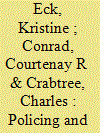

|
|
|
|
|
| Summary/Abstract |
The police are often key actors in conflict processes, yet there is little research on their role in the production of political violence. Previous research provides us with a limited understanding of the part the police play in preventing or mitigating the onset or escalation of conflict, in patterns of repression and resistance during conflict, and in the durability of peace after conflicts are resolved. By unpacking the role of state security actors and asking how the state assigns tasks among them—as well as the consequences of these decisions—we generate new research paths for scholars of conflict and policing. We review existing research in the field, highlighting recent findings, including those from the articles in this special issue. We conclude by arguing that the fields of policing and conflict research have much to gain from each other and by discussing future directions for policing research in conflict studies.
|
|
|
|
|
|
|
|
|
|
|
|
|
|
|
|
| 5 |
ID:
173780
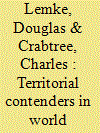

|
|
|
|
|
| Summary/Abstract |
Territorial contenders are political entities that control territory but differ from sovereign states in that they lack diplomatic recognition as legal members of the international system. One consequence of this difference is that international relations data sets have historically excluded information about them. And yet, as evidenced by the Islamic State’s impact on politics in the Middle East and beyond, territorial contenders are important actors in the international system. In this article, we introduce a new data set of territorial contenders, compare territorial contenders to other categories of territorial nonstate actors, explore how the presence of territorial contenders affects the probabilities of civil war and state failure, illustrate the conditions under which territorial contenders are more likely to emerge, and discuss a series of studies now possible given the existence of this new data set.
|
|
|
|
|
|
|
|
|
|
|
|
|
|
|
|
|
|
|
|
|